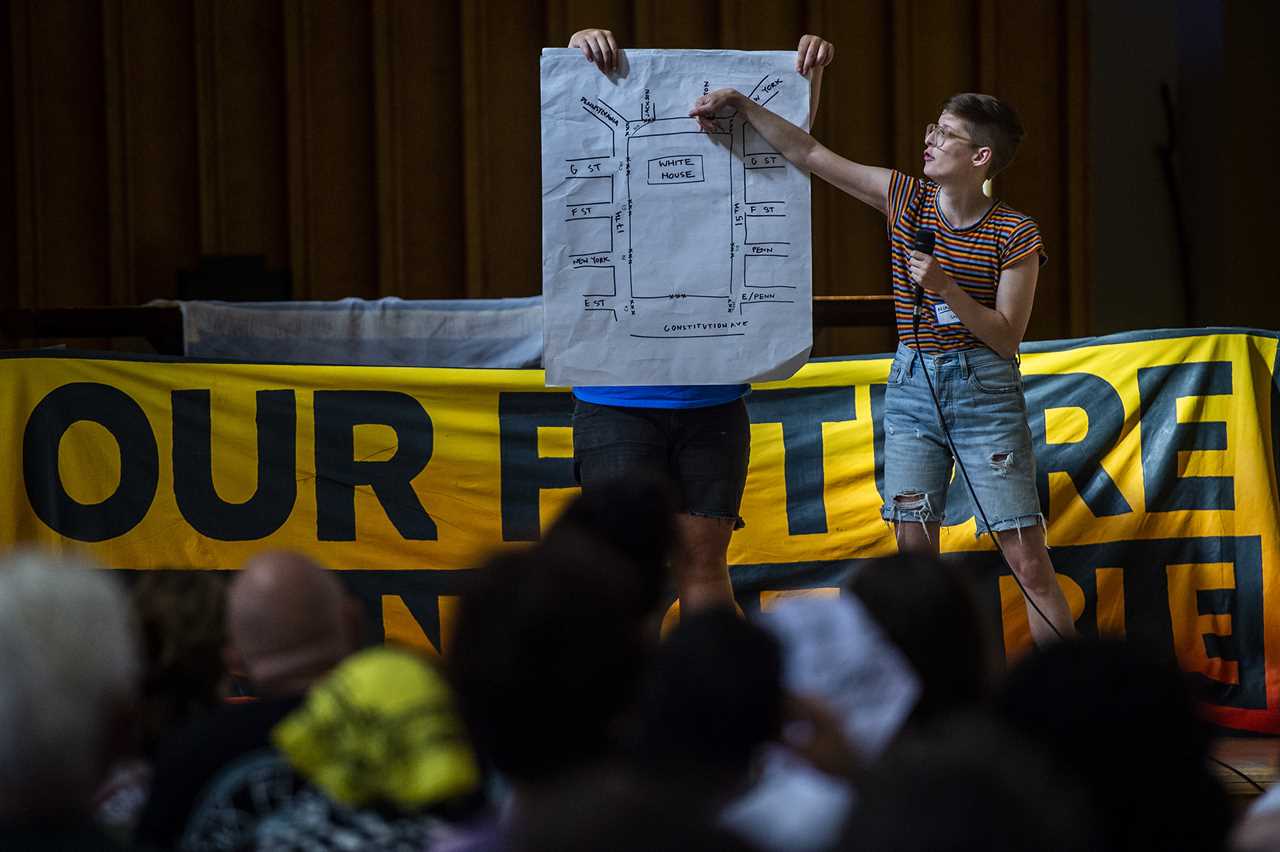
Six months ago, the Sunrise Movement was feeling bullish. The four-year-old youth climate organization had catapulted a massive legislative blueprint, the Green New Deal, to the forefront of Democratic politics. It helped elect progressives in the House and Senate in 2018 and 2020. It even successfully nudged President Joe Biden to put one of its allies in his Cabinet. Its leaders were starting to talk about how 2021 could be “Year 1” of a transformational decade of climate-driven politics in America.
They had reasons for optimism. The Democratic Party had just gained control of both Congress and the White House, and the once-controversial Green New Deal was polling well among voters. In the four years since Sunrise publicly launched in mid-2017, it had grown from a handful of former student activists to a full-fledged advocacy organization with a paid staff of more than 100 people, millions of dollars between its 501(c)3, 501(c)4 and PAC, and thousands of regular volunteers across the country.
“We’re kind of at the strongest that we have ever been,” Sunrise co-founder and executive director Varshini Prakash, who is 28, told Politico Magazine at the beginning of May this year. “We’re doing more rallies and demonstrations and actions.”
Six months later, however, “more rallies and demonstrations and actions” doesn’t have quite the same shine as it used to. As Congress started negotiating a big infrastructure spending bill this summer and fall, set against a backdrop of record-level heat waves and deadly floods, Sunrise increasingly turned up the dial on its activism — hoping to push for multitrillion-dollar green investments. Over the past two weeks, for example, it staged a five-person hunger strike outside the White House, hoping to force Biden to fight for them at the negotiating table. Yet it’s becoming clearer that the organization’s core political promise — that it could harness youthful energy and idealism to deliver true big-ticket change — will remain unrealized. The more than $500 billion in climate investment Congress is currently considering is only a fraction of what Sunrise was calling for. More broadly, the prospects of the U.S. adopting any truly radical policies to cut carbon emissions — the kind of thing many scientists say is necessary to avert climate catastrophe — have never looked slimmer.
“I’m feeling pretty enraged. We worked really hard as a movement, as a generation, as working people, to elect Biden and flip the Senate,” Sunrise’s advocacy director Lauren Maunus, who is 23, told Politico Magazine this week. “I’m really enraged that we have a Democratic trifecta and they haven’t delivered for us yet.”
What’s happening to Sunrise, right now, is a real-time test of the limits of the progressive wave of the past few years — that heady time for leftists in 2018 when the “Squad” was primarying establishment Democrats, when momentum from Sen. Bernie Sanders’ first presidential campaign was creating new horizons of possibility. The thesis driving the movement was pretty simple: If you push enough Democrats — in the public and the halls of power — to the left on an issue, the party will follow, much the same way the Tea Party and Freedom Caucus leveraged an obstinate minority to push the Republican Party to the right.
Sunrise, in particular, has promoted itself as the most effective vehicle for young people who want to push the government to go big on climate — more engaging and populist than traditional environmental organizations like Friends of the Earth, and more focused on real-world political results than theatrical new groups like Extinction Rebellion. The movement has been profiled by the likes of Vox and Vogue. “Sunrise has established itself as the dominant influence on the environmental policy of the Democratic Party’s young, progressive wing,” the New Yorker wrote at the end of 2018.
But this year, Sunrise’s strategy has run up against a roadblock all the enthusiasm in the world can’t budge: In a 50-50 Senate, with no margin for error, climate policy is subject to the veto of whoever the most conservative, most cautious Democratic senator happens to be. In this case, that person is West Virginia’s Joe Manchin, a canny coal-state power broker who sees green policy as bad for both his constituents and his electoral chances. He’s made clear he won’t vote for any spending bill that, in his view, will hurt the economy — while the Democrats require his vote for anything they do. And for that, Sunrise has had no answer.
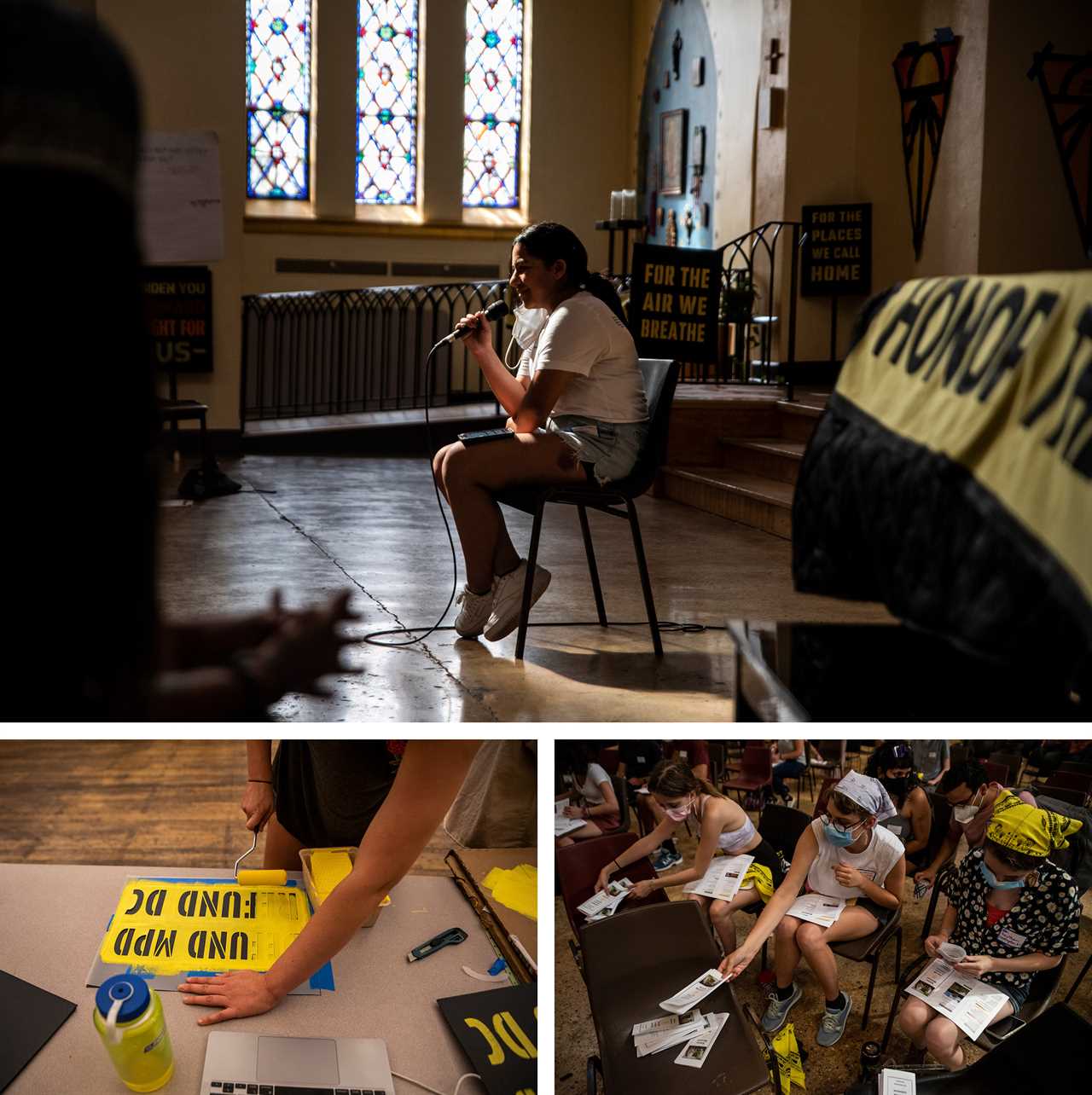
Increasingly, the movement that seemed like the future of progressive politics has found itself at an impasse: attacked by pundits for impeding its own cause, wading into diffuse non-climate causes of the activist left, racked by internal conflict and out of options to deal with Manchin.
Now, Sunrise is faced with a question about how to move forward: embrace the idealistic side of its mission and keep hammering Biden — the president who’s on the verge of making more progress toward the climate agenda than any of his predecessors — for not going far enough, or embrace its pragmatic side and declare a partial victory whenever Congress passes its spending compromise?
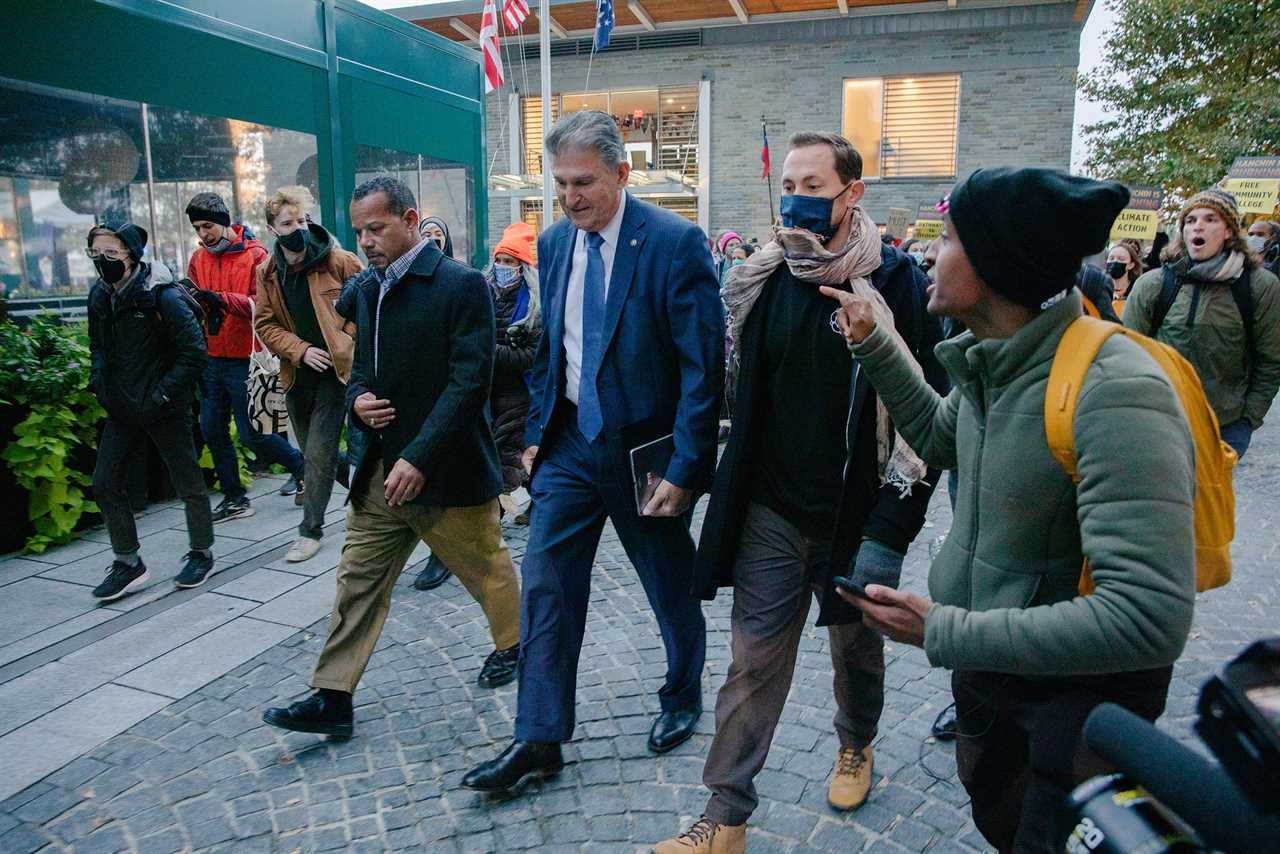
By all indications, Sunrise is prepared to take the latter route. It ended its White House hunger strike this week and shifted gears to urge quick passage of the compromise bill. Sunrise’s leaders seem to recognize that an at least somewhat positive outlook may be necessary to keep youthful energy alive in a political world that seems to specialize in killing it.
In the wake of Biden releasing his framework for the spending bill last Thursday, the movement held a mass Zoom call, on which Prakash said: “I am sad that the pieces on climate, even though they are really significant, are not enough to put us on a path toward a livable future.” At the same time, she didn’t want to say that Sunrise’s efforts amounted to failure: “Everything that is good in this bill,” she added, “is because of movements like ours.”
“I’ll be honest,” Sunrise’s communications director Ellen Sciales said on the same call, “this was our best shot in a long time of passing federal policy at the scale of the crisis, and this past year has been really freaking hard.”
“Three-word chant! Three-word chant! Three-word chant!”
On a Sunday in late June, dozens of teenagers and twenty-somethings stood in church pews and repeated in unison an empty placeholder phrase — literally, “Three-word chant!” — as they pretended to hold signs in their hands and got coached on the best posture to be taken seriously (neither “slouched” nor “robotic”). The next day would be Sunrise’s first major protest against the Biden administration — an administration that Sunrise helped put in power and which it wanted to keep on its toes. The group had convened hundreds of activists from around the country to St. Stephen’s Episcopal Church in Washington to prepare.
Sunrise leaders don’t think of their movement as just another Extinction Rebellion, the youth environmental activist organization that, for example, in April dumped wheelbarrows full of cow poop outside the White House to protest Biden’s “bullshit” climate plan. Sunrise frames its protests as more than just noisemaking. “This is not a symbolic action,” Sunrise staffer Benjamin Finegan, who is 24, emphasized to the people gathered inside the church ahead of the planned protest in D.C. They should be prepared, Finegan warned, to remain outside the White House, where they would be divided into groups blocking each official entrance, “until our demands are met.”
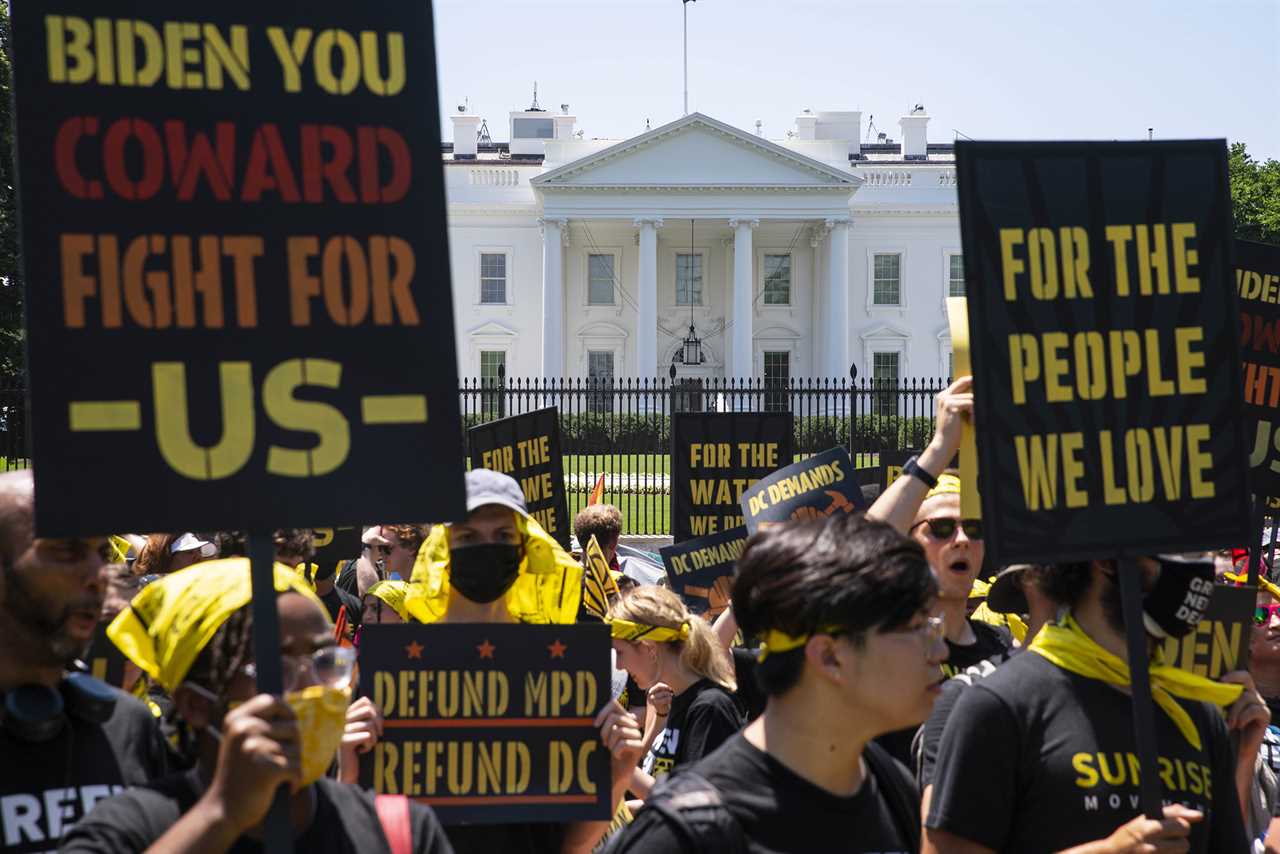
The next evening, however, Sunrise leaders explained that they planned to end the protest as soon as some of their members got arrested, which they expected to happen. Before 5 p.m., about an hour after chickpea burgers were passed out, word spread that at one entrance, several Sunrisers had been removed by Secret Service. The hundreds at the various other entrances then picked themselves up and gathered at Lafayette Square to celebrate, where they were soon joined by the “arrested” group, who had been quickly released. “What we just did is f---ing amazing,” one Sunrise staffer shouted into a microphone. “We just shut down the White House!” It wasn’t clear that any of their demands had been met.
The political demands were supposed to be the whole point. In a book released last year, Prakash, Sunrise’s leader, wrote that Sunrise didn’t come up with the idea or phrase of a Green New Deal (versions of it have been batted around since as early as 2007), nor did they inspire “the largest numbers of people to take to the streets in recent years — Greta Thunberg and the Friday school strikers did that.” Instead, she wrote: “Sunrise’s unique contribution, where we have excelled, has been in taking the fight to the political arena, bringing some of these ideas to greater prominence in the mainstream. We’ve done this by combining a political savvy with a disciplined and fast-growing movement set on a clear goal.”
But a political strategy based almost entirely around electing and working with close political allies, or at least those deemed convincible, may not be so savvy when it finally comes down to governing.
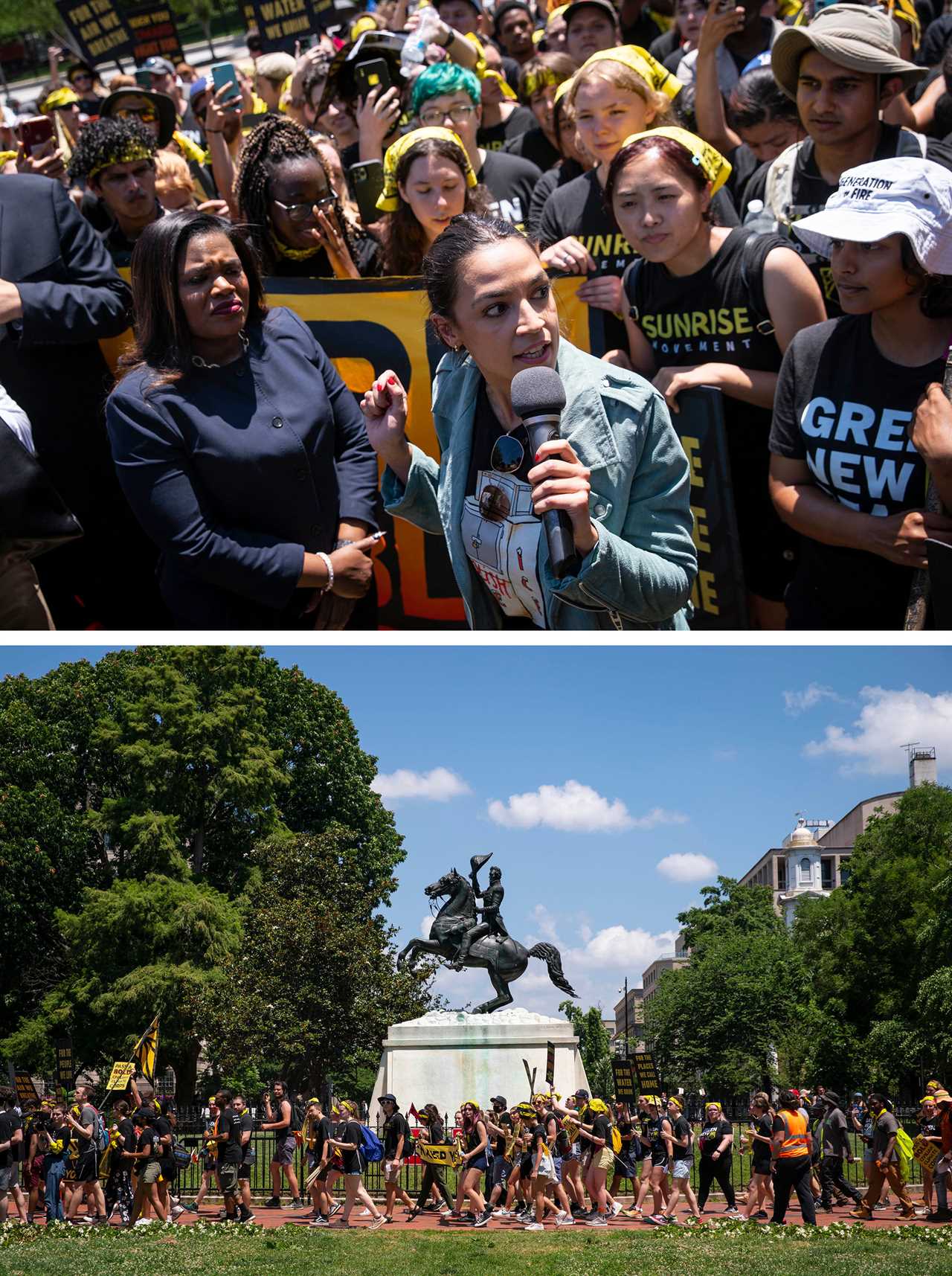
When Sunrise officially launched in mid-2017, it set its sights on the 2018 midterm elections. From the very start, Prakash wrote in the introduction to her book, Winning the Green New Deal, Sunrise never bothered trying to win over Republicans — describing the entire party as “simply too far gone.” With fewer than 70 full-time volunteers and almost no paid staff, they door-knocked and campaigned for progressive candidates in New York, Michigan, Pennsylvania and Florida. Many of their endorsements did not win, but a few did, including Reps. Alexandria Ocasio-Cortez, Ilhan Omar and Rashida Tlaib — who soon became known as “the Squad” — as well as now-Interior Secretary Deb Haaland. The movement got the beginning of what it was looking for: unapologetically progressive “climate champions” in Washington. Just days after the election, Ocasio-Cortez helped put Sunrise and the Green New Deal on the map by joining the group in a sit-in at incoming Speaker Nancy Pelosi’s office.
But a Democratic House wouldn’t be enough to pass climate legislation. That would require the White House and the Senate. In 2019, Sunrise — now with much more media attention, exponentially higher cash coming in and a growing force of supporters— needed to come up with a plan for 2020.

Again, the organization focused attention on not just the top of the ticket but downballot races, helping to solidify their allies in Congress, adding Jamaal Bowman and Cori Bush to the Squad, and working with Massachusetts Sen. Ed Markey to beat back a primary challenge from Joe Kennedy III. When it came to the presidential election, Sunrise endorsed Sanders in the Democratic primary and gave Biden an “F-” rating on his climate plan. When Biden won the primary, however, Prakash, Sunrise’s leader, got a spot on the Biden-Sanders “unity task force” that would help formulate the Democratic Party’s general election platform. Sunrise then campaigned for Biden, contacting more than 2 million voters in swing states, and after his election, the group was dubbed by CNN an “early winner” in the transition. A few days later, Jon Ossoff and Raphael Warnock won their runoff races in Georgia, and Democrats captured the Senate.
Sunrise now faced a new horizon. Its entire existence up to now had focused primarily on helping progressives win elections while Republicans controlled government. How would it get what it wanted in a Democratic Washington?
Sunrise didn’t need to start from scratch. It had had a small presence in D.C. for years, an office currently led by the 23-year-old Lauren Maunus.
Maunus has been advocating for policy since she was 13, when she pushed for schools in her home state of Florida to label ingredients and allergen information in cafeteria food. In 2018, she signed up for “Sunrise Semester,” a summer fellowship with the group, which she spent organizing for Michigan gubernatorial candidate Abdul El-Sayed (who ultimately lost). She then led Sunrise’s Rhode Island “hub” while in college at Brown University, and she came to D.C. to work full-time for Sunrise after graduating. She leads what she describes as “all our congressional work.”
“What that looks like,” Maunus, now a registered lobbyist, explained to me earlier this year, is primarily collaborating with allies on Capitol Hill, like Markey and members of the House’s Congressional Progressive Caucus. Maunus said she works with the Squad and other allies, helping to coordinate their appearances at Sunrise rallies and also strategizing how to garner “enough support for their ideas within the broader Progressive Caucus.” The most immediate goal, this year, was getting Sunrise-backed climate policies woven into the giant infrastructure spending package the Democrats were assembling.
Since Sunrise never intended for the Green New Deal to be a single bill but rather a “governing agenda,” those policies are many and expansive: The group has advocated for a Green New Deal for Public Housing, a Green New Deal for Public Schools, a Green New Deal for Cities and, the idea Sunrise has campaigned hardest for this year, a Civilian Climate Corps, or CCC.

With a Democratic majority in Congress and Democratic president, Sunrise’s leaders felt the pieces were in place to get at least some of them passed. They just needed to figure out where the most pushing was needed.
Sunrise started the year focused on the filibuster. As soon as Democrats won their 49th and 50th seats with both the runoff races in Georgia, the group issued a statement saying, “First, Democrats must abolish the filibuster.” In April, when asked point-blank what she saw as the biggest obstacle to Sunrise’s success this year, Sciales, Sunrise’s communications director, identified the filibuster. And in May, Prakash told Politico Magazine, “For us to really be able to pass the whole vision of what it takes to stop the climate crisis, it’s essential that we abolish the filibuster.”
“Every way that you turn, there’s some arcane Senate rule that is corrupting our ability to get the progress that we need,” Prakash said. But filibuster reform, which would lower the bar from 60 to 50 senators needed for a typical bill to pass, was a political nonstarter, barely considered by Biden or the Senate.
As it turned out, it wasn’t an arcane Senate rule that would keep progressives from getting more ambitious climate legislation passed. Democrats decided to put most of their agenda into a budget-reconciliation bill, which only requires 50 senators to pass. The obstacle, since then, has been dissenting Democrats.
Manchin, the chair of the Senate Energy and Natural Resources Committee , has been the main one standing in the way of progressives packing the reconciliation megabill full of climate provisions. Biden can’t pass any legislation without his support. (Manchin’s office did not respond to questions for this story.)
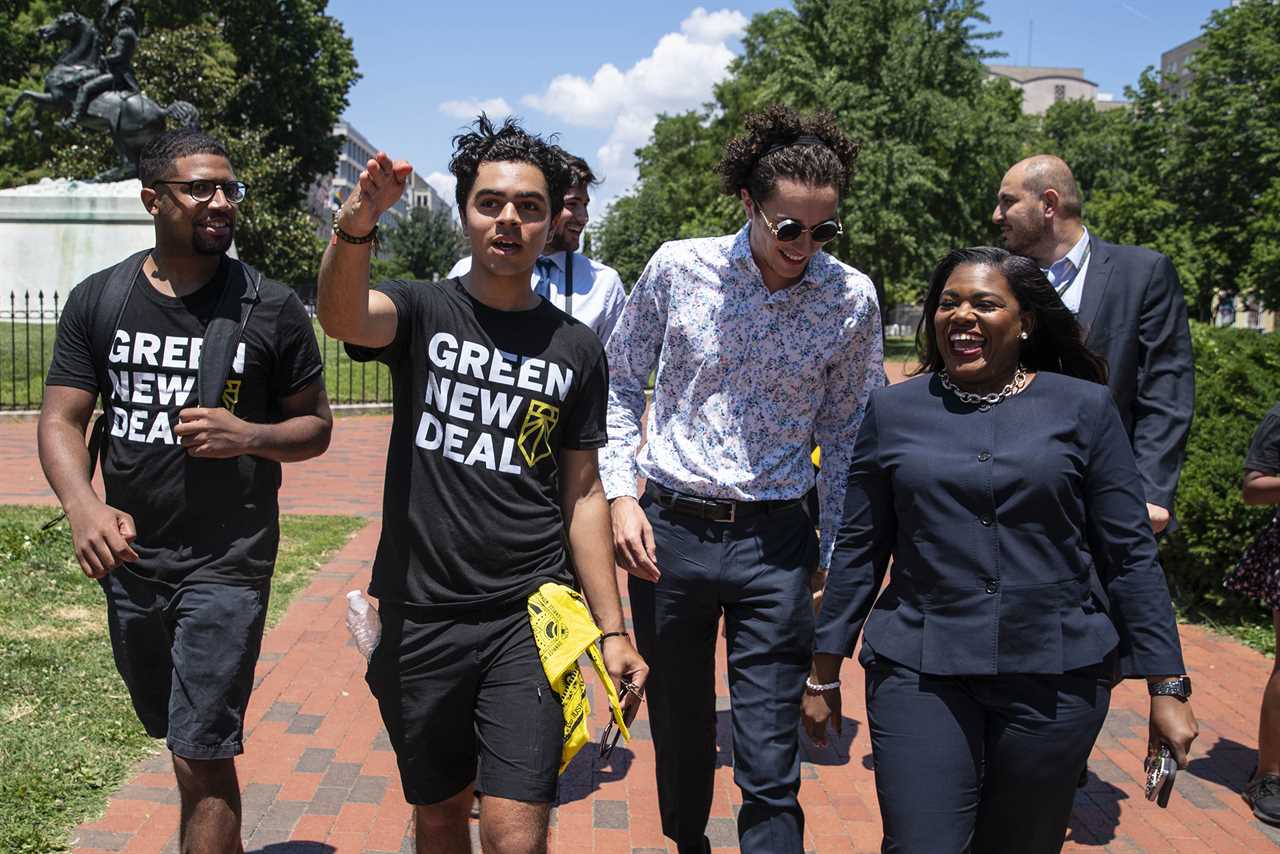
At first, Sunrise’s instinct for dealing with Manchin was to draw from its campaign-season playbook, despite the fact that the senator does not face re-election until 2024. When I asked J.P. Mejia — a spokesperson for Sunrise who turned 19 this summer and is a freshman at American University — in April what Sunrise’s plan for Democrats like Manchin was, he explained that the group would do its best to “expose” how the senator was representing special interests over his constituents. “We have to explain the shady backroom deals that are being done with big oil companies,” he said, which Sunrise has indeed tried to do — though it has had no noticeable effect on Manchin himself.
In reality, Sunrise’s most pragmatic approach to overcoming Manchin amounted to old-fashioned legislative hostage-taking: The group pressed its allies in the House to hold up Manchin’s favored bipartisan-negotiated infrastructure bill — or “some fake fossil fuel funded bipartisan bullshit,” as one Sunrise event flyer put it — until the Senate would agree to a reconciliation bill that would include more climate action.
Maunus describes Sunrise as having an inside/outside game that’s still working. As evidence of Sunrise’s success at the inside game, Maunus has pointed to how congressional progressives’ have been able, on multiple occasions, to block a vote on the bipartisan infrastructure bill so long as a big reconciliation bill isn’t passed alongside it. And earlier in the summer, when even some centrist senators started tweeting “no climate, no deal,” Maunus credited Sunrise’s “outside-game” movement pressure for “creating the conditions” for the catchphrase to arise organically.
The problem with that strategy, however, is that Manchin seems to think it’s a bluff — and he’s willing to call it. The senator knows that many Democrats don’t want to lose the bipartisan infrastructure bill, and that the progressive wing of the party won’t be able to hold it up forever. But he, on the other hand, is willing to hold up forever a reconciliation bill not to his liking. Last month, Manchin told reporters that, between him and a united Republican caucus, progressives simply lacked a majority for their most ambitious proposals. “For them to get theirs, elect more liberals,” he said.
That leaves Sunrise stuck. The group can’t help elect more liberals to the Senate until next year, and by then, Democrats are expected to lose their majority. This fall, the group continued to focus its biggest efforts on Biden instead of the Democrat actually standing in the way of their goals, hoping that the president would be able to nudge Manchin in their direction — even though Manchin, as the prospective 50th Senate vote on the reconciliation bill, arguably held far more leverage than the president.
In late October, five Sunrise members began their hunger strike outside the White House, saying they’d continue fasting until “politicians pass Biden’s full Build Back Better agenda.” Even after Biden released a framework for the reconciliation bill last Thursday, which included $555 billion in climate spending, the hunger strikers pledged that they wouldn’t let up until it was passed. That was until this Tuesday, when Manchin threw the fate of the reconciliation bill back into uncertainty by suggesting that he wasn’t on board with a deal to pass it alongside his bipartisan bill. The same day, the Sunrise hunger strikers ended their fast and called for a new last-ditch mobilization in D.C. to take place on Thursday, this time targeting Manchin.
When asked what the desired outcome of the rally was, Maunus told Politico Magazine, “bringing more people into the fight.” Whether Manchin comes around to vote for the reconciliation bill or not is on Biden’s back now, she said. Sunrise is ready to look to its next challenge, which is motivating people to turn out for progressives in 2022. “Manchin represents what is broken, and we need a lot of people to be activated to fix it.”
The fizzling of Sunrise’s biggest goals in Washington comes on the heels of a difficult stretch for the organization. In the last year and a half, Sunrise has expanded its focus from purely environmental politics to advocacy for defunding the police, Palestinian liberation, raising the minimum wage, immigration reform and a host of other progressive issue areas, many of which carry cultural and political baggage that climate does not. In July, liberal blogger Matt Yglesias accused Sunrise of “losing the plot.” Among other things, he mentions the group’s lack of “a single-minded focus on climate.” Yglesias further argued that Sunrise’s overall strategy in the near term is potentially harmful in the long term. “The idea that making Joe Biden unpopular so Democrats do poorly in the midterms would somehow pave the way for more aggressive rather than less aggressive climate policy,” he argued, was absurd. “It’s pointless mass movement cosplay in lieu of real analysis. … If Republicans take over Congress, then the scope for legislative action will narrow considerably.”
Even the socialists at Jacobin magazine published a lengthy piece in August calling on Sunrise to “pursue a new direction in its tactics” given that it “seems to have hit a wall as of late.”
“The emphasis on media attention-getting stunts,” Jonathan Guy and Sam Zacher, PhD candidates at Berkeley and Yale respectively, wrote, “was perfectly suited for the pre-Biden era. Yet as the action turns from setting the political agenda to winning and implementing policy over the long term, Sunrise’s existing model has clear limitations.”

The Jacobin authors highlighted Sunrise’s lack of a coherent ideology: the group’s principles, they write, to “stop climate change and create millions of good jobs in the process” and “fight for the liberation of all people,” are so broad “it’s difficult to assess what compromises are worth making, or how to measure success.” They also criticize Sunrise’s “one-size-fits-all” approach to protests, in which the climate activists simply apply the exact same tactics from various movements of the past to the present, such as a series of marches held in May and June, without any apparent critical thinking about whether such tactics are the most appropriate for their goals.
And lastly, they criticized the group’s top-down structure, a mass movement led by a small group of directors with little input from its widespread members. The authors suggest Sunrise’s centralized command is “undermined” by its insistence on giving Sunrise hubs independence to pursue their own initiatives that may be at odds with the national organization’s priorities. This became a problem recently, for example, when Sunrise’s D.C. hub came under intense criticism after putting out an anti-Semitic statement, which the national organization later disavowed.
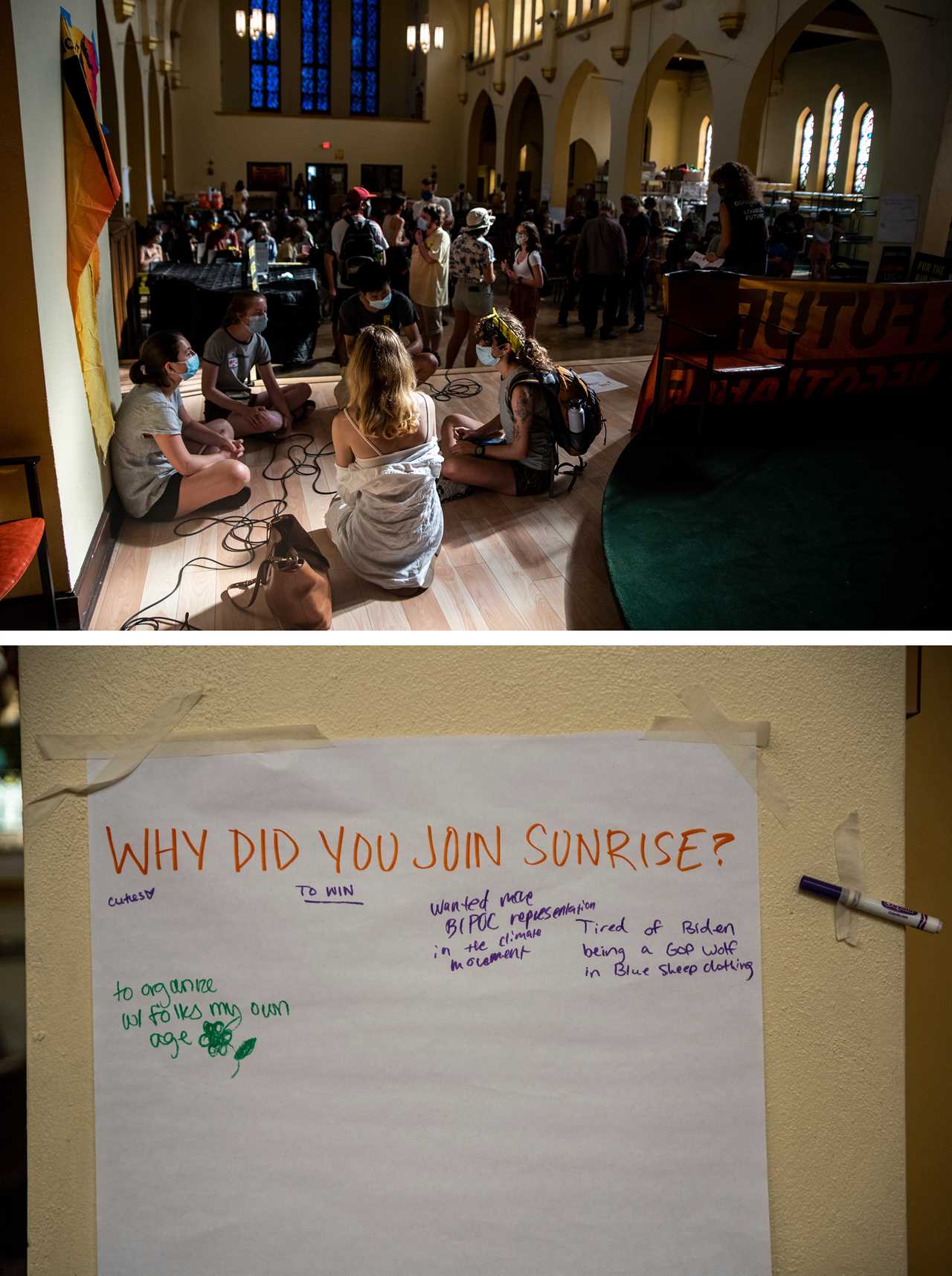
One other notable critic this year has been a former Sunrise staffer: Alex O’Keefe, who was fired in June after tweeting a laundry list of complaints about the organization’s shortcomings, particularly when it comes to diversity and inclusion and support for people of color across the movement. Sunrise leaders say that they dismissed O’Keefe, who told Politico Magazine he “definitely was the most high-profile Black leader in the movement,” for not showing up to work. At the same time, they also say they are taking his critique seriously; the group pointed to an internal team it assembled last year to brainstorm its future, including an improved culture.
Still, the episode and fallout has dented the organization’s morale, and the right has seized on it as well; Fox News aired O’Keefe’s most caustic quotes in a story headlined “Left-wing climate group Sunrise Movement torn by internal division.” O’Keefe told Politico Magazine he went public because he had already been a part of internal discussions that went nowhere before he quit the organization: “We just kind of would have the same meeting over and over again, you know, and nothing would change. It was just the illusion of change.”
While O’Keefe says he doesn’t believe in Sunrise’s ability to reform itself under current leadership, the group plans an overhaul that goes beyond its organizational culture; it hopes to unveil “Sunrise 2.0” in January, trying to use the lessons it’s learned so far — and the sharp critiques of O’Keefe and others — to reboot itself completely for the next political cycle.
Mejia, the Sunrise spokesperson, who is on the team planning for the next phase of Sunrise, says they’re looking at every area they can improve from goals to political strategy. “We’ve had an analysis that we actually haven’t been organizing much over the past few years. What we have been doing is mobilizing,” he said. “We have mostly been activating people who are already on our side but not actually broadening the bands of the universe of like people we bring in.” He also readily admits the group’s flaws: “We tout ourselves as building a movement that is cross-class and across races, that will push forward the message of the Green New Deal,” he said, “and right now we don’t have that kind of movement.”
But Mejia is more sanguine than O’Keefe about the group’s successes, and its future: “Essentially, what we want to do is not throw the baby out with the bathwater.” One result of this introspection, he suggested, may be for Sunrise to double down on its local strategy going forward, focusing even more on state- and city-level politics. If the Democrats lose Congress in 2022, then the prospect of Sunrise-style change in Washington itself pretty much vanishes, left to Biden’s limited executive power. The action will be almost entirely elsewhere.
There are some legitimate successes that Sunrise can point to from this year, including several targeted protests that did bring new allies into the fold. For example, the New York City branch of Sunrise campaigned for the CCC outside Senate Majority Leader Chuck Schumer’s state office in early July. “Prior to Sunrise Movement’s involvement, Senator Schumer had not yet been outspoken on the creation of the Civilian Climate Corps, let alone given a commitment to it,” Sunrise wrote in a statement. A few days later, Schumer came out in support of the program.
Plus, if you had told Sunrise’s founders four years ago that, in 2021, Democrats would have the presidency, a slight majority in the House and exactly 50 senators, and use that to pass an approximately $1.75 trillion infrastructure package including some $550 billion in climate and clean energy investments — the largest-ever climate spending bill, which is set to achieve the target of 50 percent U.S. emissions reductions from 2005 levels by 2030 and which funds a 300,000-member Civilian Climate Corps — they’d probably be thrilled. But when Biden’s starting point was $3.5 trillion for the overall infrastructure package and Sunrise’s demand was at least $3.7 trillion in climate investments alone, it sounds more disappointing.
Sunrise has won over at least one influential skeptic in the world of Democratic organizing. Sean McElwee, a progressive strategist who runs the polling firm Data For Progress and who admits to disagreeing with many of Sunrise’s tactics of the past, despite collaborating with the organization on some initiatives, says he thinks Sunrise deserves credit for its influence on the reconciliation bill: “If you look at the package, as it has shrunk from 3.5 [trillion dollars] to 1.75, climate has grown in share. It did not take the same haircut that a lot of these other provisions have taken. And I think that’s in large part because Sunrise has made it pretty painful for the Biden administration and for Democrats to oppose climate.”
In the long view, he says, “That means that they did something right.”
McElwee adds that he thinks “Sunrise has grown a lot” and that there’s now “a real sense of wanting to get gains across the finish line” apparent from the group’s recent push to win passage of the compromise reconciliation bill despite its shortcomings. Two years ago, Prakash described incrementalism as “pathetic.” The mentality shift from then to now, McElwee says, “points to real maturity.”
Still, that assessment, McElwee emphasizes, is contingent on the reconciliation bill becoming law. And there’s no clear path for how Sunrise can ensure that with Manchin standing in the way. All Sunrise can do is keep making noise.
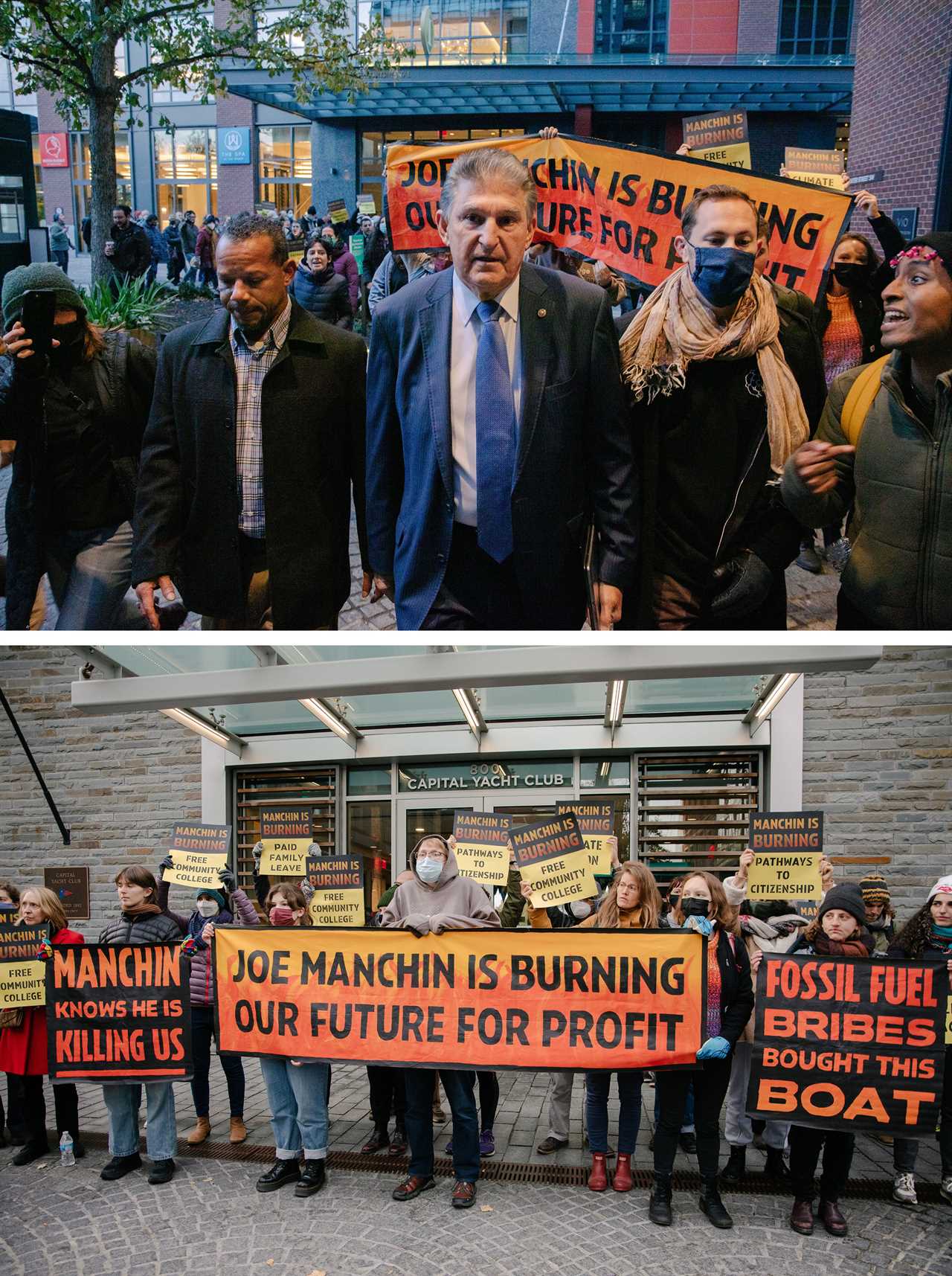
At the crack of dawn Thursday morning, about 100 protesters showed up at the D.C. dock to Manchin’s houseboat, where they confronted the senator with shouts of “We want to live!” and signs that read “Manchin knows he is killing us.” Maunus told Politico Magazine the night before that while there was a political demand — they were asking Senate Democratic leadership to remove Manchin from his chairmanship of the energy and natural resources committee — the main point of the rally was to name and shame Manchin: “We can’t allow him to get away with all of this obstruction, and just get off scot-free,” she said. “He needs to look us in the eyes and tell us that his actions will be responsible for millions more deaths around the world and like millions of people who will have asthma who wouldn’t have otherwise or millions of people drinking polluted water.”
“We’re not going to just stand by and let that be the norm of what’s OK in our democracy and in Democratic politics,” she said. “We are going to say this all directly to his face.”
Sunrise’s latest three-word chant, echoing throughout the parking garage the West Virginia senator was trying to leave to start his day, was a cry of pure frustration: “F--- Joe Manchin.”
In the end, Maunus told Politico Magazine this week that Sunrise was “never naïve thinking that Joe Manchin would support Green New Deal-style climate policy.” She said the organization’s call at the beginning of the year for Biden to spend $10 trillion on climate investments over 10 years, described by Sunrise in April as “only scratching the surface of what is needed,” was meant less as a realistic desire and more to set a marker. “We would never enter the scene putting out demands that are far below what science and justice require.”
After all, for all its funding and media attention and for all the questions about its strategy and tactics, Sunrise is still at its core a group of earnest young people trying to solve a problem that older generations failed to address and effectively handed off to them. And it’s people like Manchin, not them, who are ultimately rendering the movement most powerless.
Prakash wrote in her book last year that Sunrise still had a plan to prevail in circumstances like this: “Even if the men in suits say no to our demands — as they will many, many times — we might still be on the path to victory, if we’re building enough people power. If we’re growing the majority and growing the base, we’re winning, because even if our demands aren’t met, we can always come back with more people and more support until we win.”
Still, right now, for all the grandeur of such pronouncements, there’s an acknowledgment that this is the moment that could make or break Sunrise’s hopes of a better future. Mejia, in an interview this summer, pointed out that the climate clock is ticking: “We can’t just wait for younger folks to grow up and swarm the halls of power,” he said, “because there isn’t enough time for us to do that.”
----------------------------------------
By: Ruairí Arrieta-Kenna
Title: The Movement That Almost Changed the World
Sourced From: www.politico.com/news/magazine/2021/11/05/sunrise-movement-manchin-climate-activism-democratic-washington-518558
Published Date: Fri, 05 Nov 2021 03:30:02 EST
Did you miss our previous article...
https://consumernewsnetwork.com/politics-us/youngkins-stunner-the-surprising-strategy






